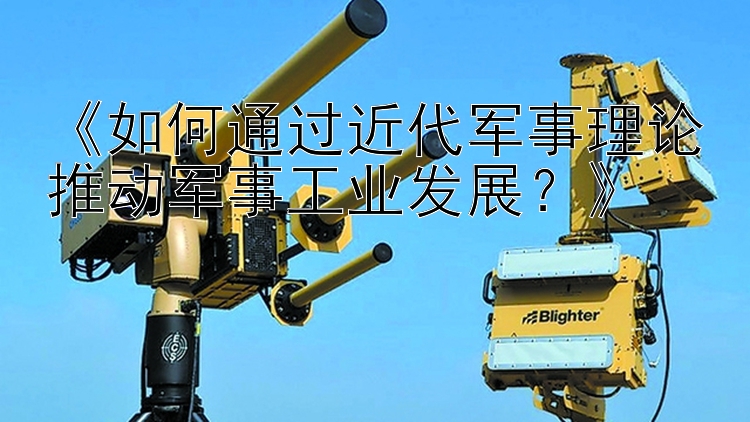在近现代历史中,军事理论的进步不仅影响了战争的形态和战略战术,也对军事工业的发展起到了重要的推动作用。以下是一些关键的历史事件和思想家,他们的军事理论对军事技术的创新和发展产生了深远的影响。
- 拿破仑时代的战争革命(The Revolutionary Wars of Napoleon)
-
在拿破仑时代,法国军队采用了新的组织结构和战术,如集中指挥、快速机动和大规模炮兵的使用等。这些变革对武器设计和生产提出了更高的要求,推动了火炮和其他军械的技术革新。
-
克劳塞维茨与“总体战”(Carl von Clausewitz and "Total War")
-
Prussian military theorist Carl von Clausewitz's concept of "total war," which emphasized the mobilization of a nation's entire resources for warfare, had significant implications for industrial development. Armies now needed vast quantities of weapons and equipment, leading to the expansion of munitions industries and the adoption of mass production techniques.
-
海权论与海军技术(Mahan's Theories on Naval Power)
-
Alfred Thayer Mahan's theories about naval power in the late 19th century focused on the importance of sea control in winning wars. This led to investments in large battleships and other advanced naval technologies, such as steam engines and ironclad armor.
-
冯·毛奇与参谋制度(Helmuth von Moltke and Staff Systems)
-
German General Helmuth von Moltke developed modern staff systems that streamlined communications and planning within armies. These systems required efficient supply lines and logistics networks, driving innovation in transportation technology and the creation of new materials like steel for railway construction.
-
马汉的机械化战争理论(J.F.C. Fuller's Concept of Mechanized Warfare)
-
In the early 20th century, British officer J.F.C. Fuller advocated for the integration of tanks into warfare, envisioning them as key components of mobile, mechanized forces. This theory spurred research and development in tank design and related support vehicles, such as armored personnel carriers and self-propelled artillery.
-
空军理论与实践(Giulio Douhet's Airpower Theory)
-
Italian General Giulio Douhet's ideas about strategic bombing with aircraft revolutionized air combat strategies during World War II. The need for long-range bombers and fighters with heavy firepower stimulated aviation industry growth and advancements in engine technology, aerodynamics, and avionics.
-
核威慑理论与导弹技术(Bertrand Russell & Albert Einstein's Advocacy for Peace)
-
After World War II, the advent of nuclear weapons changed the nature of conflict forever. The doctrine of mutually assured destruction (MAD) necessitated the development of sophisticated missile delivery systems, including intercontinental ballistic missiles (ICBMs) and submarine-launched ballistic missiles (SLBMs), which pushed rocketry and space technology forward at an unprecedented pace.
-
信息安全与网络防御(Cybersecurity and Network Defense)
- In contemporary times, concerns over cyberwarfare have driven nations to invest heavily in cybersecurity measures and offensive digital capabilities. This has led to advances in encryption, network security protocols, and defensive software development.
综上所述,军事理论的每一次重大突破都伴随着相应的军事技术和工业能力的提升。从古代的攻城器械到今天的无人机和人工智能,军事理论的创新始终是推动军事工业发展的强大动力。未来,随着科技的不断进步和社会的复杂化,军事理论与军事工业之间的互动关系将更加紧密,为维护国家安全和国际和平提供坚实的技术支撑。